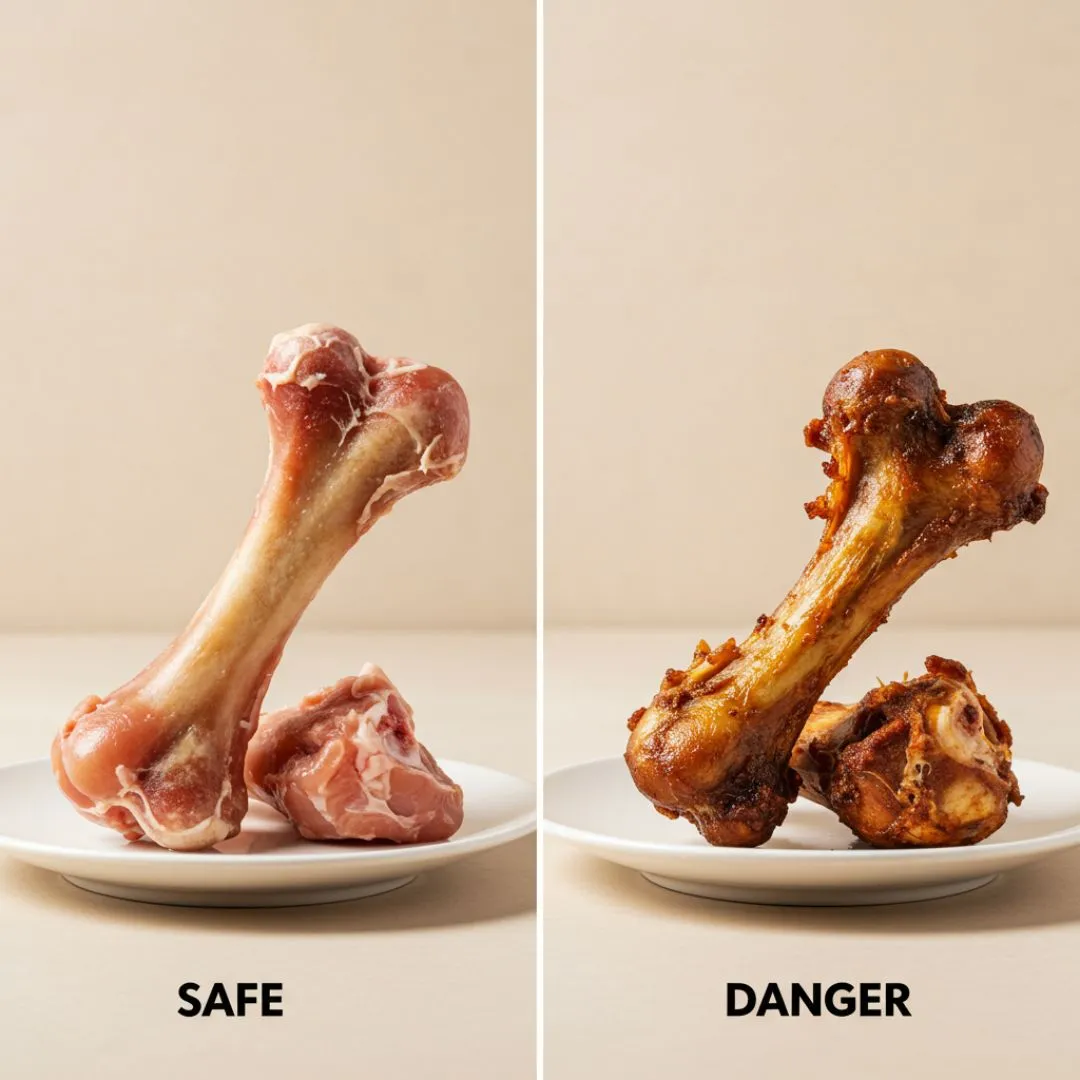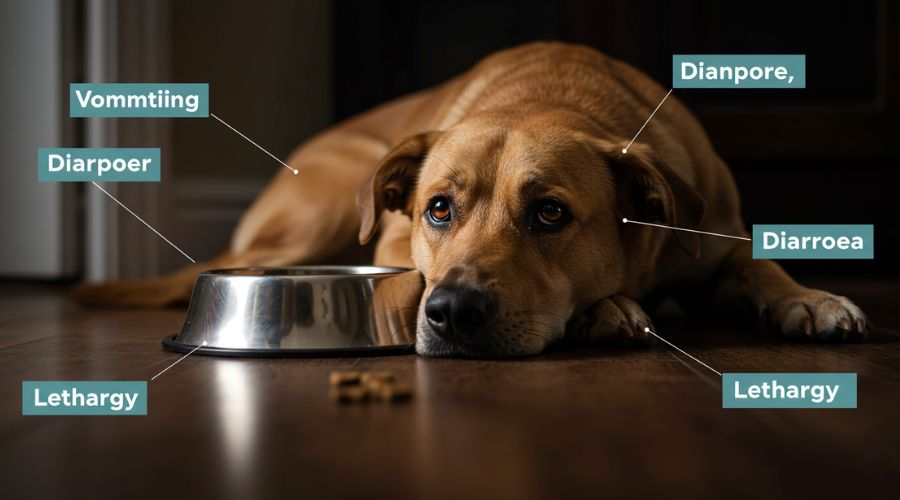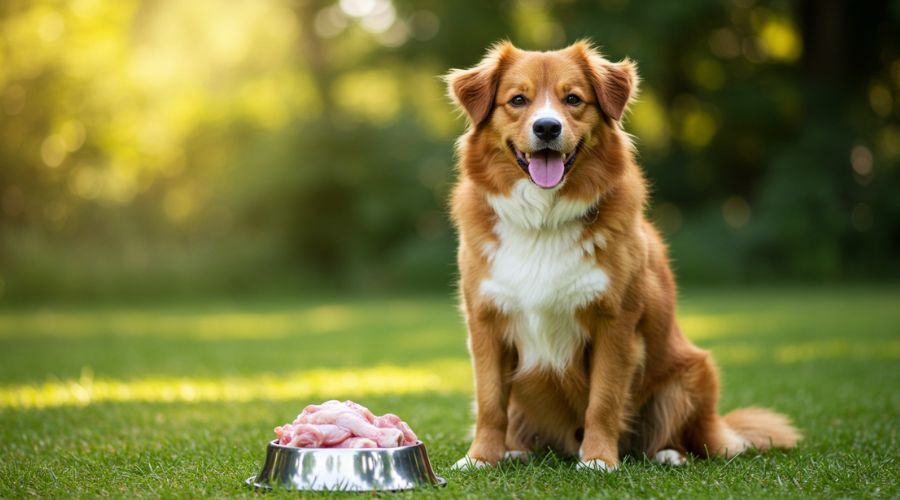Your Question is [Can Dogs Eat Raw Chicken?] The Answer is that Dogs can eat raw chicken, but there are risks involved. Raw chicken Dogs may contain harmful bacteria like Salmonella and Campylobacter, which can lead to food poisoning in dogs. Additionally, raw chicken bones can pose choking hazards or cause internal injuries if they splinter.
If you’re considering feeding your dog raw chicken, consult with a veterinarian to ensure its diet is balanced and safe. Cooked chicken is often a safer alternative, as cooking eliminates bacteria and parasites.
Can Dogs Eat Raw Chicken? A Comprehensive Guide to the Benefits, Risks, and Best Practices
Feeding your dog raw chicken is a topic that ignites a fierce debate among pet parents, vets, and nutritionists. On one hand, raw feeders swear by its benefits. On the other hand, cautionary tales abound of bacteria, bone injuries, and long-term health consequences. So, where does the truth lie?
Let’s unpack everything you need to know about dogs and raw chicken—with no fluff, just facts and guidance rooted in expertise and care.
Why Raw Chicken Appeals to Pet Owners
For dog owners looking to provide a natural, ancestral-style diet, raw chicken is often seen as a staple. Besides being readily available and inexpensive, it’s also packed with protein. A raw diet based on chicken mimics what dogs might eat in the wild for many raw feeders.
But can dogs safely eat raw chicken? Yes, they can—but whether they should is a nuanced discussion that deserves close inspection.
Nutritional Value of Raw Chicken for Dogs
Raw chicken offers a range of nutrients that benefit dogs:[Can Dogs Have Raw Chicken]
- High-quality protein: Essential for muscle development and energy.
- Chicken fat: Provides caloric energy and supports coat and skin health.
- Bones: Rich in calcium and phosphorus, especially beneficial for teeth and bone development.
- Cartilage and connective tissue: Sources of glucosamine and chondroitin for joint support.
- Livers and gizzards: Nutrient-dense with vitamin A, vitamin B12, iron, and more.
However, these benefits only apply when the dogs eat raw chicken is part of a balanced and well-structured raw diet—not as a stand-alone food.
Raw Chicken Alone Is Not a Complete Diet
Dogs require more than just raw chicken for dogs to meet their nutritional needs. A complete raw diet typically consists of:
- 80% muscle meat
- 10% secreting organs
- 10% raw, finely ground bone
- Vitamin and mineral supplements (as needed)
Feeding plain raw chicken dogs—without balance—can lead to deficiencies over time, especially in calcium, zinc, and certain B vitamins.
Can Dogs Eat Raw Chicken Bones?

Dogs can eat raw chicken bones, but cooked bones are a no-go. Here’s why:
- The soft and pliable nature of raw bones reduces their chances of splintering.
- Cooked bones, however, can shatter into sharp fragments, causing choking, internal injuries, or gastrointestinal obstructions.
Still, raw bones pose some risks, especially to [Can Dogs Eat Raw Chicken Bones]
- Small dogs may try to swallow bones whole.
- Dogs that eat too quickly or aggressively.
- Dogs with existing dental or digestive issues.
Tip: Always supervise your dog when feeding raw bones and ensure the bone is an appropriate size.
The Bacterial Risk: Salmonella, Campylobacter, and More
This is the core concern for most vets and dog owners: bacterial contamination.
- Raw chicken can harbor Salmonella, Campylobacter, and E. coli.
- While dogs have more acidic stomachs than humans and may tolerate certain pathogens, they are not immune.
- Dogs shedding bacteria in their stool can expose humans, especially the young, elderly, or immunocompromised, to dangerous infections.
Handling raw meat safely is crucial:
- Wash hands before and after feeding.
- Sanitize bowls and surfaces.
- Store chicken properly—ideally flash-frozen immediately after processing.
Side Effects and Signs of Illness

If your dog reacts poorly to raw chicken, symptoms may include:
- Diarrhea
- Vomiting
- Lethargy
- Loss of appetite
- Dehydration
An older dog, a puppy, or a dog with a compromised immune system is more likely to contract foodborne illnesses. If symptoms appear, consult your vet immediately.
Raw Chicken and APN: A Serious Concern
Recent research has linked raw chicken to a rare neurological condition in dogs called acute polyradiculoneuritis (APN)—similar to Guillain-Barre Syndrome in humans. APN is thought to be triggered by Campylobacter, which is sometimes present in undercooked or raw chicken.
Signs of APN include:
- Hind limb weakness
- Progressive paralysis
- Difficulty breathing in severe cases
While APN is rare, it’s a compelling reason to avoid feeding raw chicken necks, which are particularly risky.
Is Cooked Chicken a Better Option?
In many cases, yes. Cooking chicken:
- Eliminates pathogens like Salmonella.
- Makes meat safer for immune-compromised dogs.
- Offers flexibility for bland diets during gastrointestinal distress.
However, cooking also destroys some beneficial enzymes and nutrients. This is why many raw feeders advocate for raw over cooked—but safety must come first.
Understanding Different Parts of the Chicken

There are different nutritional benefits associated with each part of the chicken:
- Raw Chicken Breast: Lean, high-protein, low-fat.
- Thighs and legs: Higher fat content, great for energy, and fed in moderation.
- Necks and wings: Good balance of meat and bone, but supervise for choking hazards.
- Feet: Excellent for dental health.
- Organs: Rich in vitamins and minerals—feed in moderation.
- Skin: High in fat—limit if your dog is prone to weight gain.
The Benefits of Raw Chicken For Dogs

Proponents of raw feeding cite these benefits:[Can Dogs Have Raw Chicken]
- Healthier skin and coat: Thanks to natural fats and amino acids.
- Better digestion: No fillers, artificial additives, or preservatives.
- Improved joint support: Collagen, glucosamine, and chondroitin.
- Fewer food allergies: Especially in dogs sensitive to kibble ingredients.
- Cleaner teeth and fresher breath: From chewing on raw bones.
- Smaller, firmer stools: Less waste due to more digestible content.
How to Feed Raw Chicken Dogs Safely
Here’s a best-practice checklist:
DO:
- Introduce raw chicken gradually.
- Balance with other proteins (beef, lamb, turkey, etc.).
- Include organs, bone, and supplements.
- Source from reputable, hormone-free, antibiotic-free providers.
- Store in deep freeze and thaw in the fridge.
DON’T:
- Feed raw if your dog has a compromised immune system.
- Offer raw chicken without consulting a vet or pet nutritionist.
- Keep meat at room temperature for long periods.
- Feed cooked bones—ever.
Frequently Asked Questions of Can Dogs Eat Raw Chicken?
Q1. Is raw chicken good for dogs to eat daily?
Ans. While some healthy adult dogs may tolerate raw chicken, feeding it daily is not recommended. Overexposure increases the risk of bacterial infections and nutrient imbalances. Always rotate proteins and consult a vet to ensure your dog’s diet is complete and safe.
Q2. What should I do if my dog accidentally eats raw chicken?
Ans. If your dog eats raw chicken, monitor them closely for signs of vomiting, diarrhea, or lethargy. Most healthy dogs handle small amounts well, but puppies, seniors, or immunocompromised dogs may require vet attention.
Q3. Can dogs get sick from salmonella in raw chicken?
Ans. Yes, dogs can get sick from salmonella, especially if they have weakened immune systems. Even if they don’t show symptoms, they can still shed harmful bacteria in their stool, posing a health risk to humans.
Q4. Are raw chicken bones safe for dogs?
Ans. Raw chicken bones can be safe if given under supervision. They should be appropriately sized to prevent choking. Never feed cooked bones, as they splinter easily and can cause serious injuries.
Q5. What’s better for dogs—raw or cooked chicken?
Ans. Cooked chicken is generally safer because cooking eliminates bacteria. However, raw chicken retains more natural enzymes and nutrients. If feeding raw, ensure it’s balanced, clean, and vet-approved.
Conclusion of Can Dogs Eat Raw Chicken?
Yes—with caution. Dogs can eat raw chicken, but the keys are balance, hygiene, and expert guidance. If you’re just dabbling or switching from kibble, start slow, do your research, and speak with a veterinary nutritionist.
If you’re not ready to build a raw diet from scratch, consider premade, vet-approved raw diets that use high-pressure processing (HPP) to reduce bacterial risk while retaining nutritional integrity.
Feeding raw chicken dogs isn’t a decision to make lightly, but with the right prep and care, it can be a healthy part of your dog’s diet. Just remember: safety, variety, and professional input are non-negotiable.

